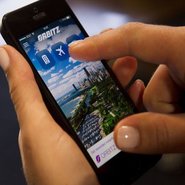By Brielle Jaekel
The majority of online travel booking services are missing out on smartphone reservations, with 76 percent not fully mobile-optimized, highlighting the need to reduce Web page payloads and optimize scripts, according to a new report from Radware.
Slow loading times on mobile is the main reason 36 percent of travel brands claimed to be the principal cause of abandonment, which is a significant loss in sales for these booking Web sites. Two out of three consumers expect mobile pages to load in four seconds or less, but these sites are failing with an average load time of 6.7 seconds on iPhones, causing serious drop out rates.
"The degree in variability in network speeds can really have an impact, even on flagship devices with relatively fast processors, on load times,” said Matthew Young, performance evangelist at Radware. “This is true even for mobile, touch-centric sites.
"The number of sites not optimizing their content for an efficient user experience is way too high,” he said. “Travel companies with physical locations do everything to ensure their customers have a good on-site experience, and the same should hold true for companies where their operations rely on browser interactions, including mobile, to complete their bookings."
Mobile booking
As mobile is becoming the most predominant method in booking travel for consumers, these retailers seem to really be missing the mark. Mobile optimization is key in keeping consumers engaged, ready to spend and decreasing cart abandonment rates.

More than 36 percent of travel booking sites even exceeded more than 10 seconds to load, which is sure to cause a serious amount of purchasing dropouts. There is 41 percent of overall abandonment rate in the travel industry as a whole.
The load time varies through devices with the load time on Samsung Galaxy S6 seeing better results with a median speed of 4.1 seconds. However, it is important that these retailers enforce faster load times on a wide range of devices to ensure all customers will have an optimized experience.
Fixing the problem
These Web sites are seeing problems that can be remedied such as too many requests for images, scripts and files and large images. Radware’s research showed that responsive web designs looked aesthetically pleasing to consumers, but the speed is not up to par.
This is also a significant issue because users are looking for mobile to load as fast as desktop Web sites, with 85 percent of mobile users expecting the same speed. With half of all travel bookings predicted to take place on mobile in the upcoming year, it is vital for these retailers to mend these issues.

"Travel brands, and all companies with Web sites, need to reduce the payloads of their web pages across the board,” Mr. Young said. “Lower the number of round trips baked into sites, optimize scripts and images, and consider consolidating to one URL.
“This will greatly enhance the user experience and reduce the number of abandoned bookings,” he said.
Final Take
Brielle Jaekel is editorial assistant at Mobile Commerce Daily
{"ct":"HEWORoMAMNfv8nnazOQhhE7rgiShBzxIseWXXavmewhzBD9LJ3eQgwxFtcWt4yAbOODn+HxTQQLJk69qs1EXgNS8JEdKwxC3H11OrfAvQPK74wdTwv1M356tkcoQ6fpESGZu5473amuTh6hwFPzk\/dg6mbxa1oXcD+JrwPpUVpfkguuXjMsDTAnMn2q653qyDy2ZlMYj3VpUzEdBJ98nSTyOZDKHnbokcQJZW0sSyMKYPnVHRyya8Y3N5GYSjURclgzhGdnBV5K97\/b3G6sxe1hhDX9VkSmcGzS\/wYSIPQzAXbOhlHTUZDKPQXjpprpVW6\/Yrb1SUnZ\/g0IbjEQC8xWTpLOxvQYaVMUaTcB1v0W4SQkQREq5YCuXdSqn6IAgTHIU0WeMBDtxKM+J\/iMWr34ur+ZP\/ejUBRzVhTVuB75bsgE8zWnI8vk4KSXKrsenxMHlIhdPnyeGo\/i9scLI+QIdQDHzRTqcC0TwGYdQWz2RKyG\/SeY5prZhG21uXsV6Qy6++YfoxP3tP+VjK8cdTtslqhIVl2hagtT7ndxMkbQKEmb4Xtyui9yKsiIIFS+GkU7SxlH7p1v8BuVYjqRWcp26AnS4PF7tc0Qn\/YgJ\/TeYQ0MTYQRdsyRl3QnXty1tgK4lrD\/XOyDzydRcIsyKeoV0nN+WW54tX4qtQNVCGW14LBSx1B\/l1jO2pz1A2Ui1Oifkjgy22axSUM8YPZ43Qd7c9CiyrDozqLRzmqndIRK7rZqWkRnVHH4cZ1K0Rsk09lL1A4g73mVXopcL\/G0vEfC9vCDEcWqXIDO6N\/i1Rl0TXpHinNW7zKNcMOIy8L4YamemTH8QN8YWZ18qS92vHedMkUvHhTIz810AaLyYOj3+KReuOA00\/8xvlSgB1uzRA+wOXXsVe\/X56IGqqWs+ASAPHhJ1YzltTXz\/rPXulDdZrnFOMTY8uw8ATaYK0RajFoN2o\/ohFlpkyQE5\/ZOqEgWztJu4S7uGyN1RAaTUock+HF9bfUY8XpAuwu6ygJ4aDPjQ1JcsejInU3rJ+ZvYs0eZ5rV3+9wRNCcgaInut6BmJMcEipTOrrd0qOk+2CHSmbYd162fGa97uIIoFNdwKN6sdnuLoY0mUbPtI8k8CQNFSC0zbrE\/JVBF+v2o8XVlVP07\/RkNL78bKSNxFUuxx4oWFKvcBgKVj94m9uAl\/cDsJw3t0i5VI+zHhTIFmFRpHo88E92YmKKXgSQfDembV1Zw8uorku7xPTdgtHK+TwjcFXCaSLxKZaef3C+JATGx2y\/CkPEawwCzcXY8xTXKXVNaH7iXgJHdpdaNlcZpcHbqZvSIy+qGA3Xc9U73EzojwTh7TU+p3d3Z\/XHtxeiDlj+iqK6689OPGWXT\/M0\/IwbseJgYlb0+jZhSjSILcUWp\/Giemp2s09Y5Lq+ORyTFT5P3byvNyU3A3QwoPfzmMGng07aJVYAiJd8HqcNMYYCG0AtXnsbJAEhmbH1H7UMy\/mS3FsVXE\/QrRdq1JtsHAO9jzyWcZOthx5HJOe2J69zrRbiLarTNg7UOYUMcJfVmHEoWeCR32DsytQi\/VRpTRV\/eTJIGg3c8jpXMzLZrwVk1OisAzvm2OJZfq7vHB5v2nDIt6HwIeJaNN7HXUMmk7VHRyeh\/Vu9JHGpeXnWdAzK6f7UtCykWyyC9zr8smTcoQeu8c5F53A4MGMptZmQrqgGYCiBFqLWiFa7GeOhbCHI6+D6v+yahioFee1YtsBE9okvXRvF3qR4RFIEhvuXKO9YVqRVTuRSP1ZjOBTGAN6KkkVihlwA+GKysdc4rMajbAmSDMdqoyLCN9AGWBLQ7ccnRWrGkfqMeJRyoTTAfTNb5owwqjQrIbX36GHIbvAB0s\/hsQ9wK5DkfUi6rZhAsfFS1\/Q+h+RNJqB4YYLmBjgAYI\/BNUJHZfI8PA9XbTnrhOR5U3KEYJuqOQ4GozknkuAaMKt6aMevJvjdfXzbRtoeJTaXsTp\/YOPmIbxiT8h9Am28TdhyXf2pzrB\/8w1qCkxYPLsmxPrRHROrFhFPuceuQR7GR3kr\/puGpFSd0VjkCiW7hNpk9Sb7ltZaC\/zF3Esfa7411V7+hchwHUbgYSWx256YgEvi3L1UIOkWPbE0lfvOmIA7C7TUF7MFmQtjy\/YkB6aXqr284zr\/k6jN7f5c88pzzvIR8Sts2AuQUI2eTCfpPz6FTLaZWvhWh3QAkxs59X2PZeJj\/Q4kgssRPuyKAj04TsT1LiMRex6YTXAButrOSYlJx3YfLQlNIoJ+gc3M5ISfeD+uf+gPf+IwShmYKyxlO\/PVsPkCQf2WyH8+IqIbTag0fpGnrUlBu7nSMI5g+wGULbsfRVTkPxPq+CNIQ18uRBteUCA2XbkuPXFMitVCtaNblNS3VrZykLcDdkGVam79CVgyd3EJ9J87N5V815qa9Fm10Rx2T4s\/RXKo\/fr86WGbjTIBgcxlUPK3r63\/Loe319rxx8DCHN2gD5HUhvIEtfixQ6tUpdTdT4PDb9HhC8+SycUILdx3\/YYOhzoqqGqMiu++hQboY2FWDGPfYt3FhCsyg2KDqdgwu1jvMxfUqYkNSDx4Tmcj77KmrjFY0z2T+v2\/2gtedNw11QM7yyhvOXqIcrn5qh2hWedAQDFErAg4jgnswnkKDV5bNrFI9qYGLnEv2cCFFsB4KQ66FVdBij1E\/JgyVW8LJ7CGLT8yVPW4FFRflR7m8Q9EQp92lphMj\/uPvRgkzEAN7P7pFGqzEm7ZOOooN3\/KfdIXYYThPjVPpmzhR8a41kZD+N\/aISJq5+4RKeAlNWEDg\/D9oclSlhdyHz5b5PIzPk89EDxHvKwjTUQv7vA0OhsNuhPfTirZEnU6BzAPmFk\/GQyNtmz1n4q7pRZZQEURB5r7NmvbY0zrSEvESdJWOS3rzGBh\/+y8Zvbg32+e7m2pLKwo5BhubWMvzO0ZMsTJsOviMw8en63wuKvm2EV4RERuQc7cU7ZWdV50oY3oJ\/a0wJBtvnOPRfTyLYL7vneMGsCmM6\/yDkaimZ7eQxpwAss1ro8H+DRG8spyTPispYDDEAcSbhGo6bagczv8aGSb3iDO7pW61CR\/0AfsiEk2TpMqcCSzCj6Cpl00StSefhDm8Y5HTjQirVCiVXzmEGoEehwDToEu48qRYElnJOZSktEZWCvHxzl3cKh8qMhj99gkh3jAHgTX0YB4dqy2BRCmlcFBYyaA9qiakYtvaqhY+bm6mk0zHJZgbpyzIwZuUZhCFv4F3OozEuoaODaJpspbFNjUCOUM\/9nj66n3ncD6LQYNKUiiGgyIm8Fjt0OFeWbV3qsjh5ebRULdL5Zz\/hZ9ogCStT5yRfjC+N+xtE\/f2G\/Fhzd\/wEz2kcfTU9f7RUGazvsuI7UFiY1PxtMUIH9c6P+rYgrTMTJ3RJIRZadCnR1BUauwgy6+VNG03CdgqGt+ZFM2JXQTmBS8qq9tsXXfvhE9n7HwR3J453GEl+F\/IAO8HDJwMpRrb\/8fV56eC9SwxhBqXxk4Ex1kq+hi5I49ctqzTIcFBa0OYgMLiogTaD288aTgW\/H74nP8pFL\/2ZN6q4bKoXohH6ofw3D37TbWnaW24bNehvCGtdxPpQb\/kj7xd8w5hQ2nmfIPZQtIp6PRMjKAwtStQ8y8d9UIW4vr\/wc2KHIYOchiCuJsljBKiWR4WI1gSlAa3DJBzziu2sQHva9uCJz+puP8\/F7Gtg0ONkX\/uTzWrkO2dknux3uS7V6euw8+S\/evGudl9PYj7A7HFehXppe\/p9V5yU8Fbk8X4xWzg8lsLi0a7gUUulkvvsSaRwc85dDkPfIprCMsjCsAd4ef\/XfiULtpkvOHXw2vaRnMz7ip0FOZOdk+QpuxZujMs5rcdGY2IMLGoKCh4CmzwxfyIDEkrSMUVW24k5RtYWuW689p14lGdNcieI\/FIndRt+otdKiud7Drlk6Jh8632ZdCP3H1E\/SwR40\/nsGZvooVIsTJu6arelyI9vUTNIY3DdvU14SZSdfDK+R6dOPoS7zMGCI\/VFO8lBAwDUnmgQrah1FHBHKr6p3MQvhmxHPuAzKewtxDWA9\/Ybw70c\/q0CL+QRdHhk1hg\/JX0k3QjCm\/UfRNwUAtnaLyUPZs9\/qNMSBaAbP4sahdgHWQq2YK+LWRl9MOySZy57gBBlbOlrB2Vkoyf9znLTy1zskXiRFGGxr9AUvnIu9G7\/GDG2T8\/UXpekAkdUAoKiJcucIwXMwaQSLR0LQBdoq7ZTmshPqGy7XV5nU4ddaN8JjF3PKKxB0KOj\/3uZsFVhfdS0UyZQDov62T9Gbs43lb2Q1\/e9BmKROAbaYZ2JKirW1Zi\/ZJkL01Qw8qbEw7flqnafFMvZ28Wso\/oMByTMRFbVBwt9MLHD5Rd05JBb46x2kJtzZerfrYd+f9GQjZciPnCMyOBeIs7XMppHxrCuAHlIrkxbf3sUwwsz\/4++vXoOJzvnrMMbeLLA1GHFEsu5XcHCaqe7UYThVdpA584eYwrbrowSIsn1kJjwWary7bzKhhuAu3RYLZUOwkWPrJDP4NXAtrKHx76JVY+xT8998uLv6gix85wltkmfVTvhd6YrY9hyBLFVjg4UGcyqMqlpbXrTpCmozyNbEkAyrfY5P1SWKmLHMFgYrufuDY+2hKIILEMS0jSUW8Wifs74Xh8Fp2YXQb2XeY8B2OyDkjsqVh1HFj7tlWsQNjC97yVUIpa9PeK+wZItCfsRbfRGi6VvseQp9\/Mgm3d52T8qNj7yBhGQb3tdHUmIllNfaDeegduH4093MPPL0sfS0CdpwfHN1zOAhO25f3nwUxNsVea0K3sLt+n9SmgyRrLd5d5er5r23T\/0kygLCQZA1NWCwE4I8sQlm3P5xwhh0+fliDIegOVdyCsIRe9riYy8cwq2rh2FJ5pY7+FESG5iHdISWWdCv8jPMEXQsiDojRTkvtCVNIf0qkt3M1x8lHREzzBRBh83eWxm07fwYVSqbz1c20Xi+5mTFg6MJXJq6IZefUPSsLBq+BwPShzdzY6O7ziOVzhcK2OAYWZV9+2L7aKxI8t+pUNH8dyTz\/L+uljX22L7U8nK\/qiiqT91R2T8Oayx6fDtFGm5D5f6a2+uWGNJ\/Y0uhDKB3atgOWmOqjR7rXavYIG4kFTleJak1hCU0DXXpDmyBKbl+okxg5s9y8YGrvlwp8+rPRWTWnecsSXiKxztySaBvs6UinhqXo5VA8gNwyNWTtvZN0oQdwWFdcOLlLtTUEDmbIWyy00jLhkklBaD0yVk3RsxIM2BmzgSZjbVAnfk1BoGTW57uj59\/+c8st4dXb79NvgMAYQVvZ9wVJUNhQJWpnCK7ZUQIEHMy4RJ9zNEuzQaUPj0XAnMfETGdWytBO3BMizZ4SPSwodSpdqWygxS9MbD38AbyvVz8\/yuKKp\/Mqf2F17mauqx3T41PVgD\/Anlh12rSkDOd1quK+ckgCMAW8\/L6xZDDtv3M8SKbn2VdxHzOqMRmopOjBh05B2hkVhI0emRMBNgSzsvoDcxrNM16V8OrrFfk0JrJIRxVvwiwcFbOgjb01WLI4hLtjLOIt13G0NZRN\/dN9Hid15GSkncPUrB1LPHUw=","iv":"3a26a20ff273c9c77767a2a898b91cb2","s":"d029d6623b8736b1"}
